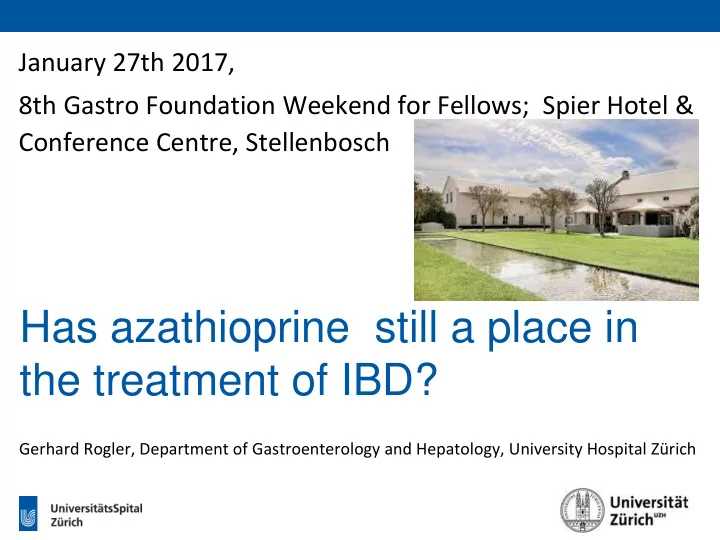

January 27th 2017, 8th Gastro Foundation Weekend for Fellows; Spier Hotel & Conference Centre, Stellenbosch Has azathioprine still a place in the treatment of IBD? Gerhard Rogler, Department of Gastroenterology and Hepatology, University Hospital Zürich
Thiopurines for IBD: Conflicting findings Reduced rates of surgery in cohort studies 1,2 x No convincing benefit for thiopurines in large population-based studies 3 Improved long-term remission by early treatment with 6-MP in children with CD 4 No benefit of early azathioprine in adults 5,6 x 50% mucosal healing by azathioprine in ileitis and 70% in colonic involvement 7 Rare mucosal healing in SONIC 8 x 1 Ramadas AV et al. Gut 2010; 2 Vernier-Massouille G et al. Gastroenterology 2008; 3 Rungoe C et al. Gut 2014; 4 Markowitz J et al. Gastroenterology 2000; 5 Cosnes J et al. Gastroenterology 2013; 6 Panés J et al. Gastroenterology 2013; 7 Mantzaris G et al. Inflamm Bowel Dis 2009; 8 Colombel JF et al. N Engl J Med 2010
Early use of azathioprine for ALL newly diagnosed patients with CD is not better than conventional therapy prospective double-blind study in patients with newly (<8 weeks) diagnosed CD (n = 65 per group) “survival free of relapse” CDAI <175 “In a study of adults with Crohn’s disease, early azathioprine therapy was no more effective than placebo to achieve sustained corticosteroid free remission but was more effective in preventing moderate to severe relapse in a post hoc analysis.» Panes et al. Gastroenterology 2013;145:766 – 774
Early use of azathioprine for ALL newly diagnosed patients with CD is not better than conventional therapy “A post hoc analysis of relapse, defined as a Crohn’s Disease Activity Index score >220, showed lower relapse rates in the azathioprine group than in the placebo group (11.8% vs 30.2%; P < 0.01). “ Panes et al. Gastroenterology 2013;145:766 – 774
Meta-analyses support a role of thiopurines for the maintenance of remission and steroid reduction in IBD Crohns ’ disease studies N OR and 95% C.I. NNT AZA for induction of remission* 13 1211 1.23 (0.97 – 1.55) - AZA for maintenance of remission** 7 462 2.32 (1.55 – 3.49) 6 AZA and steroid sparing effect** 7 462 5.22 (1.06 – 25.68 3 *Chande N et al. Cochrane Database Syst Rev. 2013 Apr **Prefontaine E et al. Cochrane Database Syst Rev 2009 Jan Ulcerative colitis studies N OR and 95% C.I. NNT AZA for induction of remission # 4 89 1.59 (0.59 – 4.29) - AZA for maintenance of remission ## 4 232 0.68 (0.54 – 0.86) 5 # Gisbert JP et al. Aliment Pharm Ther 2009; 30(2): 126-37 ## Timmer A et al. Cochrane Database Syst Rev. 2012 Sep
Thiopurines prevent surgeries in CD patients • Meta-analysis of 10 trials (12 586 patients) Study Type N HR and 95%CI HR and 95% CI 6 population- 0.64 [0.44 – 0.93] 11.148 based studies 1.438 0.57 [0.45 – 0.73] 4 cohort-based studies combined 0.59 [0.48 - 0.73] HR [95%CI] 0.1 0.2 0.5 1 2 5 10 Benefit of thiopurines Chatu S et al. Am J Gastroenterol 2014; 109: 23-34
Thiopurin effect in a population-based cohort population-based cohort (n=341) Cardiff/UK 1986-1991 1992-1997 1998-2003 N=99 N=105 N=137 Immunosuppressives 11% 28% 45%* Median time until start of 77 months 21 months 11 months therapy with thiopurines Longterm steroid-use 44% 31% 19%* Cumulative surgery-rate 59% 37% 25%* *p=0,001 Ramadas et al. Gut 2010; 59: 1200-06
Summary • Thiopurines are not (very) useful for the induction of remission in IBD patients • thiopurines reduce the number of relapes/flares in patients with CD or UC and can be used for the maintenance of remission • AZA/6-MP therapy is not useful for ALL patients (especially no at disease onset) • An individualized decision is necessary (age, risk, steroid response) • 6-MP in more than 50% of AZA intolerance successful • Therapeutic 6-TGN levels need to be achieved
Thank you for your attention
Recommend
More recommend